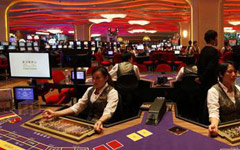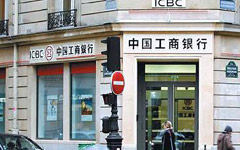Sydney, Australia's financial center, is set to become the latest hub for trading in the Chinese yuan with the authorities from both countries expected to ink the agreement this month.
The deal would see it join Seoul, Paris, Luxembourg, London, Frankfurt, Singapore and Hong Kong as one of the global centers for trading the renminbi, helping further boost China's efforts to promote the use of its currency in international trade.
 |
| Casinos chart plans to woo high rollers from China |
 |
| Sydney set to be offshore RMB center |
China is Australia's single biggest export market with two-way trade flows of around A$150 billion ($131 billion) in 2013.
However, only about?one percent is conducted in renminbi.
"It will take time to change that but maybe within five years, we could see the ratio double," said Anthony Issa, deputy treasurer at Industrial and Commercial Bank of China Ltd in Sydney.?
The People's Bank of China is highly likely to appoint a clearing bank later in November, said Issa, the next formal step in the process.
Sources familiar with the situation said five Chinese banks, namely ICBC, Bank of China Ltd, China Construction Bank Corp Ltd and Bank of Communications Co Ltd and Agricultural Bank of China Ltd were vying for the role.
The appointment would make it easier for investors to complete financial transactions, while lowering the cost of doing business for importers and exporters.
Instead of paying foreign exchange fees on Australian dollar-US dollar-renminbi transfers, the agreement would reduce the costs to Australian dollar-renminbi.
Issa said the agreement would also help expand the range of financial products including bonds, foreign exchange and equities.
Australia still lags its global competitors in adopting the "redback", as the yuan is now being dubbed, despite an early start in 2013 when a private sector-led initiative kicked off with the aim of expanding yuan business in the country.
Australian borrowers have recently started to issue yuan-denominated bonds with securities listed on the Australian Stock Exchange but still cleared in Europe or Asia.
Earlier this year, a portion of the massive $7.8 billion loan for Australia's Roy Hill iron ore project was funded in the yuan.
China's thirst for minerals has fuelled more than 20 years of unbroken economic growth in Australia. The two countries are aiming to sign a bilateral free trade agreement by the end of the year.
